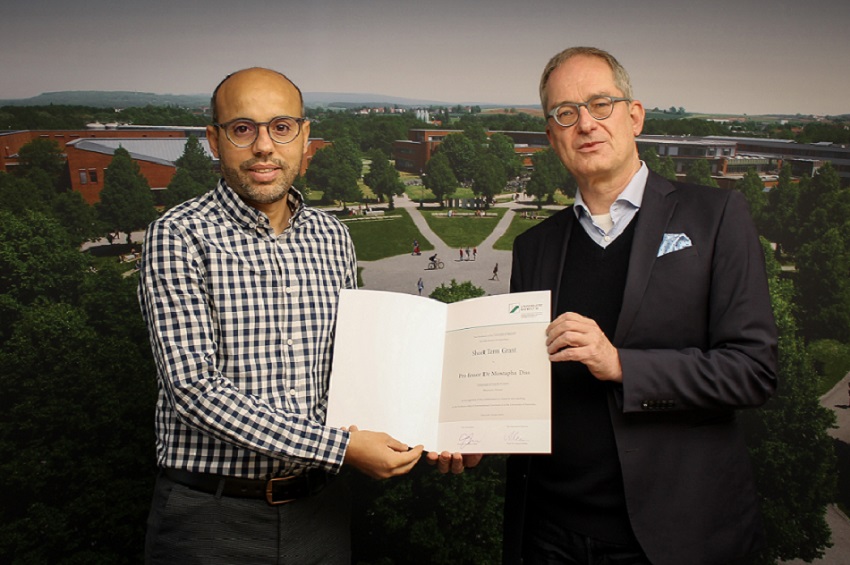Meet the Grantee: Mostapha Diss
Preference Rankings and Proportional Representation: Mismatches in Germany, 2005-2017
Does the German voting system for the Bundestag have the potential to distort the representation of voter preferences? Quite a thrilling research question! Professor Mostapha Diss and his host, Professor Frank Steffen (Economics), started to find answers during Diss’ Short Term Grant at UBT…and this stay certainly has the potential for future collaboration.

Grantee Mostapha Diss and Prof. Dr. Stefan Leible, President of the University of Bayreuth
What are the foci of your joint research funded by the Grant?
Mostapha Diss: The first aim of my project with Prof. Dr. Frank Steffen is to study whether the current system of proportional representation that is used in Germany in order to elect its Bundestag has the potential to massively distort the representation of voter preferences. We investigate if it amplifies the extremities of the political spectrum that may not actually be present in the electorate. The second aim is to discuss the source of the paradoxes that we can encounter in the German electoral system and the normative implications of these results by placing them in the context of representative and epistemic conceptions of democracy. To the best of our knowledge, this has never been done so far.
We have started our project during my first stay in November 2021 with Prof. Dr. Frank Steffen, my host at the University of Bayreuth, as well as Prof. Dr. Matthew Braham (Professor of Practical Philosophy at University of Hamburg). I hope that the project will be finished during my second stay which is planned in 2022.
In what way is your work interdisciplinary, and what does interdisciplinarity mean to you in academic work and life?
Staying at the University of Bayreuth allows me not only to continue the joint research with Prof. Dr. Frank Steffen (Economics) and Prof. Dr. Matthew Braham (Philosophy) which focuses on the study of properties of the electoral rules for the Deutsche Bundestag. I will also be able to investigate further research collaborations with members of the University of Bayreuth, such as Prof. Dr. Sascha Kurz (Mathematics), Prof. Dr. David Stadelmann (Economics), Prof. Dr. Stefan Napel (Economics), Dr. Alexander Mayer (Economics), and Prof. Dr. Alexander Stroh-Steckelberg (Sociology).
In other words, my objective is to integrate techniques, tools, perspectives, concepts, and theories from more disciplines. My current research agenda is to solve some problems whose solutions are beyond the scope of a single discipline or area of research practice (Economics in my case).
What is in your opinion the future of your field / in what way can research in your field contribute to meeting the urgent challenges of our time?
In my opinion, our society will face four long-term structural challenges: the climate change, the economic inequalities, minority representation and the demographic challenge.
Social choice theory, my research field, aims to study decision problems in which a group/society has to make a decision in a “democratic way”. This research field will have a key role in the third challenge I mentioned. Indeed, all around the world, many minority groups are severely underrepresented in local, state, and federal government. Contemporary scholars should more focus on the extent to which the interests of minority groups can be protected under multiple voting systems. In other words, scholars should make recommendations for best practice in minority representation and electoral system design.
What does international research mobility mean to you?
International research mobility means a lot to me in our new research environment since collaboration and mobility need to spread beyond national borders: First, international research mobility ensures a circulation of skills and ideas around the world. Second, it allows improvements in researcher’s professional development and academic performance. Third, it is also a means of gaining the necessary credentials and research prestige for career advancement at home. Finally, it exposes scholars to different views, knowledge, teaching and research methods as well as work practices in their research and teaching fields in the European and international context.
The Grantee:
Mostapha Diss is a Full Professor in Economics at the University of Franche-Comté, France, and a member of the research center CRESE since 2019. He has been an Associate Professor at the University of Jean Monnet, France, and a member of GATE Lyon Saint-Etienne from 2011 to 2019 where he defended hisHabilitation thesis in 2016. He holds a PhD in Economics from the University of Caen Normandy, France, in 2010.
His research has concentrated around topics in microeconomic theory, especially social choice theory. Mostapha is more specifically interested in the use of social choice methods to investigate some voting paradoxes. His research has been published in international academic journals such as Public Choice, Social Choice and Welfare, Mathematical Social Sciences, Theory and Decision, Group Decision and Negotiation, Annals of Operations Research, etc.
Current research projects include: political applications of power indices, voting paradoxes and the properties of voting rules in the committee selection setting.
